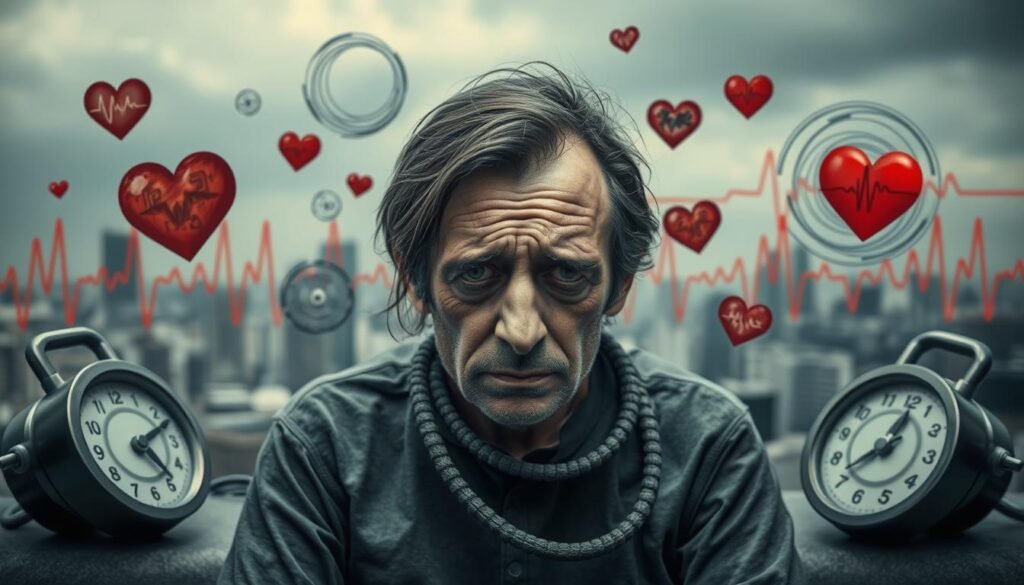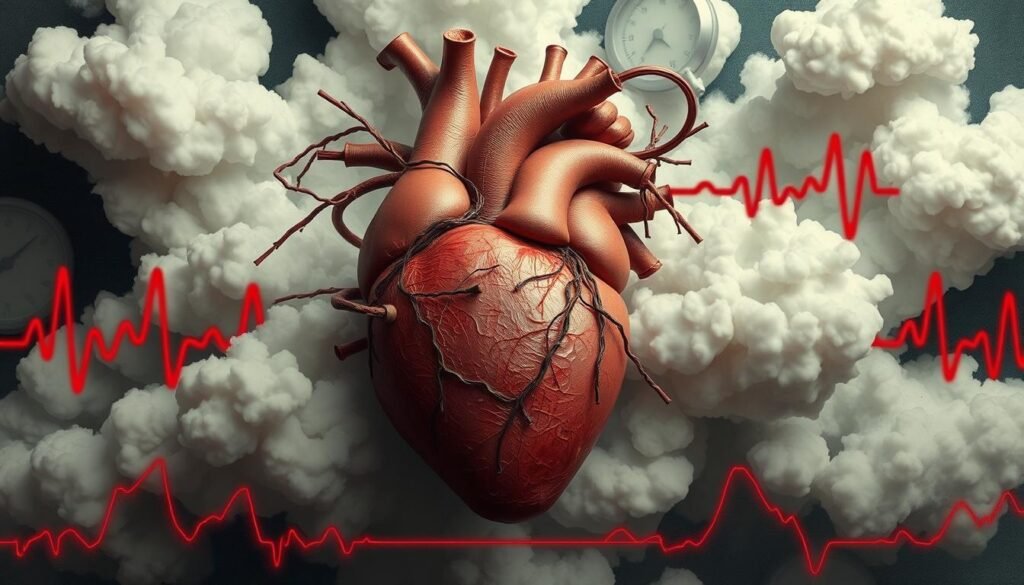Did you know nearly half of American adults have high blood pressure? It’s often called the “silent killer.” People with it don’t usually see symptoms until there’s a big health problem. Fatigue is a big but often missed sign of this condition.
This article looks into how high blood pressure and tiredness are connected. We want to understand why being tired all the time might be linked to this. For more on how it affects your energy, visit this link.
Key Takeaways
- High blood pressure is often a “silent killer,” making awareness crucial.
- Fatigue can be a possible symptom in individuals with hypertension.
- Engaging in regular exercise can significantly reduce fatigue symptoms.
- Dietary choices like the DASH and Mediterranean diets can help manage hypertension.
- Stress management is crucial for reducing both blood pressure and fatigue levels.
- Monitoring blood pressure regularly can help prevent serious health complications.
- Understanding the connection between high blood pressure and fatigue can lead to better overall health management.
Understanding High Blood Pressure
High blood pressure or hypertension happens when blood force on artery walls is too high. It often has no clear symptoms, earning it the name “the silent killer.” In the U.S., half of the adults either have this condition or are on medication for it.
Blood pressure changes during the day. It’s measured by systolic and diastolic pressure. A normal reading is below 120/80 mm Hg, says the American Heart Association. If your systolic number is 120-129 and diastolic is under 80, it’s elevated. Stage 1 hypertension has a systolic of 130-139 or a diastolic of 80-89.
Stage 2 hypertension is when systolic pressure is 140 or more or diastolic hits 90 or above. A measurement over 180/120 needs urgent care. This is called a hypertensive crisis.
Long-term high blood pressure can harm your heart and cause diseases. It might make you tired and affect sleep. Not sleeping enough can raise your blood pressure risk. About 26% of Americans between 30 and 70 have obstructive sleep apnea, a factor in getting hypertension. To understand how tiredness links to high blood pressure, check out this page.
| Blood Pressure Category | Systolic (mm Hg) | Diastolic (mm Hg) |
|---|---|---|
| Normal | Less than 120 | Less than 80 |
| Elevated | 120–129 | Less than 80 |
| Stage 1 Hypertension | 130–139 | 80–89 |
| Stage 2 Hypertension | 140 or higher | 90 or higher |
| Hypertensive Crisis | Over 180 | Over 120 |
What is Considered High Blood Pressure?
High blood pressure, also known as hypertension, is common among people. The American Heart Association (AHA) describes hypertension classifications. These classify blood pressure levels in millimeters of mercury (mm Hg). Knowing these levels is key to spotting health risks from high blood pressure.
| Category | Systolic (mm Hg) | Diastolic (mm Hg) |
|---|---|---|
| Normal | Under 120 | Under 80 |
| Elevated | 120–129 | Below 80 |
| High (Hypertension Stage 1) | 130–139 | 80–89 |
| High (Hypertension Stage 2) | 140 and above | 90 and above |
| Hypertensive Crisis | 180 and above | 120 and above |
These categories are guides to assess blood pressure and health risks. Many people don’t show symptoms of high blood pressure. About one-third of those with it don’t even know they have it. Checking your blood pressure regularly is important. This helps with early detection and management. High levels, especially over 180/120 mm Hg, might need urgent care.
Learning about these categories can help in managing your health better. To understand more about when to seek medical help, visit this helpful resource.
How Does Hypertension Develop Over Time?
The development of hypertension is a gradual process influenced by multiple factors. In the United States, about 45% of adults are affected. This equals roughly 108 million people. High blood pressure becomes more common with age. After 40, getting yearly check-ups is key for early detection and prevention.
Several factors contribute to high blood pressure. These include obesity, not enough exercise, and bad eating habits. Too much alcohol and high salt intake also make it worse. To stay healthy, you should keep your salt intake between 1,500 to 2,300 mg a day.
Certain ethnic groups see more high blood pressure. African Americans and non-white Hispanic Americans have it more often than others. Diseases like Aldosteronism and Obstructive Sleep Apnea can also increase blood pressure.
About 80% of people with high blood pressure don’t feel any symptoms until it’s very serious. It’s important to keep monitoring your blood pressure regularly. The blood pressure categories help us understand where we stand.
| Category | Blood Pressure Reading (mm Hg) |
|---|---|
| Normal | Less than 120/80 |
| Elevated | 120-129/ |
| Stage 1 Hypertension | 130-139/80-89 |
| Stage 2 Hypertension | 140 or higher/90 or higher |
| Hypertensive Crisis | Higher than 180/120 |
Stress and aging are big reasons blood pressure goes up over time. Handling stress well, like through exercise or meditation, is good for your heart. You can find more about this at the Mayo Clinic’s guide. Knowing and managing your lifestyle can greatly affect your blood pressure levels.
Symptoms of High Blood Pressure
High blood pressure is often called the “silent killer.” It might not show symptoms in many people. Still, knowing the signs of hypertension is key for early detection and action. A lot of individuals don’t know they have high blood pressure until they face serious health issues. This shows why it’s important to check your blood pressure regularly.
Some common signs of high blood pressure include:
- Fatigue
- Headaches
- Vision problems
- Shortness of breath
These signs can be easy to miss or ignore. That’s why it’s essential to get your blood pressure checked often, especially if you’re over 20. The American Heart Association suggests getting a blood pressure reading every year. Remember, a single high reading doesn’t always mean trouble unless it’s confirmed by more tests. If you’re diagnosed with high blood pressure, you might need to change your lifestyle or take medicine.

| Blood Pressure Category | Systolic (mm Hg) | Diastolic (mm Hg) |
|---|---|---|
| Normal | Less than 120 | Less than 80 |
| Elevated | 120-129 | Less than 80 |
| Stage 1 Hypertension | 130-139 | 80-89 |
| Stage 2 Hypertension | 140 or higher | 90 or higher |
| Hypertensive Crisis | Higher than 180 | Higher than 120 |
Knowing these blood pressure levels will help you understand your risk and get the advice you need. Being aware of high blood pressure signs is crucial to prevent more health issues.
Does High Blood Pressure Cause Fatigue?
High blood pressure is often called the “silent killer.” This name comes from it developing without clear signs. Studies show the link between high blood pressure and fatigue isn’t strong. While some people with high blood pressure feel tired, it’s not usual.
Exploring the Connection
High blood pressure can sometimes cause tiredness by reducing blood flow. Yet, many conditions can lead to fatigue, including:
- Anemia
- Autoimmune diseases
- Cancer
- Chronic illnesses
- Infections
- Mental health issues
- Sleep disorders
- Hormonal imbalances
On the other hand, low blood pressure is more often linked with fatigue, causing dizziness and feeling slow. Getting an accurate blood pressure reading is key. Blood pressure below 120/80 mm Hg is good. Hypertension is diagnosed starting at 130/80 mm Hg.
The Role of Coexisting Conditions
Often, high blood pressure comes with other conditions that can drain your energy. Heart disease and kidney damage are examples. They cause tiredness, chest pain, and nausea. Also, some blood pressure medications can cause fatigue. These include:
- Angiotensin II receptor blockers (ARBs)
- Angiotensin-converting enzyme (ACE) inhibitors
- Beta-blockers
- Calcium channel blockers
- Diuretics
Despite high blood pressure’s link to fatigue, many don’t feel any symptoms. Regular checks and doctor visits help manage it. Good management reduces fatigue linked to high blood pressure.
| Condition | Symptoms |
|---|---|
| Hypotension | Dizziness, lightheadedness, fainting |
| High Blood Pressure | No symptoms in most cases |
| Coronary Artery Disease | Fatigue, chest pain, dizziness |
| Kidney Damage | Fatigue, poor appetite, swelling |
Effects of High Blood Pressure on Energy Levels
High blood pressure is often called a “silent killer.” It greatly affects your energy and well-being. It makes the heart work too hard to pump blood. This can lead to high blood pressure exhaustion. Over time, your cardiovascular system wears out. This often causes tiredness and weakness.
High blood pressure can lessen the oxygen and nutrients your body gets. This is especially bad when you’re active, making it tough to keep your energy up. Research shows that about 40% of people with high blood pressure may feel very tired. This can make your life quality worse.

Living a lifestyle with regular exercise helps fight high blood pressure. You should exercise for at least 150 minutes weekly at a moderate pace. This improves blood flow and oxygen to your organs, boosting your energy. Eating lots of fruits and veggies can also lower your blood pressure by 8-14 mmHg. This can help reduce high blood pressure exhaustion.
Managing high blood pressure well can lower it and fight off tiredness. It’s very important to have regular check-ups. This is because many people don’t know they have high blood pressure. There are often no clear signs.
It’s crucial to understand how high blood pressure affects your energy. For more detailed information on this topic, check out this resource.
High Blood Pressure and Fatigue Connection
The connection between being tired and having high blood pressure worries many. In the U.S., about 108 million adults deal with high blood pressure. Many of them feel tired because of it. Studies show this tiredness comes from complex changes in the body’s health.
When blood pressure goes up, it can affect blood flow. This makes it hard for the body to get enough oxygen. Not having enough oxygen can make you feel tired and low on energy.
Kidney disease is also a key factor. High blood pressure is a major cause of kidney problems. Bad kidney function can make you feel tired, dizzy, and confused. As kidneys get worse, these problems can get even bigger. It shows why it’s important to regularly check your health.
What we do everyday can also make a difference. Losing a little weight and exercising can help lower blood pressure. Eating well, like the DASH diet, helps too. This can make you feel less tired.
Knowing the symptoms helps manage them better. If you’re dealing with tiredness from high blood pressure, it’s crucial to understand why. This knowledge helps in finding ways to feel more energetic and healthy.
Medications that May Cause Fatigue
Fatigue is a big problem for those taking blood pressure medicine. These meds, needed to control high blood pressure, often make people feel very tired. It’s important to know about these blood pressure medication side effects.
Diuretics, beta-blockers, and ACE inhibitors often lead to feeling tired. Diuretics can lower fluid levels, causing dehydration and fatigue. Beta-blockers, such as atenolol and metoprolol, slow the heart rate, making you feel worn out. ACE inhibitors help with blood pressure but can leave some feeling sluggish.
Some antidepressants also contribute to fatigue. Tricyclics, like amitriptyline, are known for this. It’s vital for those managing both anxiety and hypertension to understand these effects. Lexapro, used for anxiety, can make you tired, especially at the beginning.
Benzodiazepines can also make you very sleepy. Their effects can last for days. They can dull the central nervous system, causing a range of tiredness. Over time, you might need more to get the same effect, making the fatigue worse.
For those treating pain, opioids like oxycodone and morphine can make you drowsy. Muscle relaxants such as carisoprodol and cyclobenzaprine also lead to tiredness by affecting the brain.
Handling tiredness with blood pressure meds might need teamwork with your doctor. They can adjust your meds to lessen side effects. Checking in regularly helps keep blood pressure in check and improves life quality.
Managing Fatigue with High Blood Pressure
When you have high blood pressure, feeling tired can be tough. You can try different lifestyle changes to deal with it. These changes help control your blood pressure and can also make you feel more energetic. Adding physical activity, getting better sleep, and reducing stress are key steps.
Lifestyle Adjustments for Energy
Staying active is important if you’re fighting tiredness with high blood pressure. Working out boosts your energy, lowers stress, and helps you sleep better. Important steps to take for controlling high blood pressure include:
- Maintaining a healthy weight to ease your heart’s workload.
- Having a regular sleep routine to enhance sleep quality.
- Using stress relief methods like yoga or meditation.
Dietary Considerations for Better Health
Nutrition is key in tackling fatigue when you have high blood pressure. Eating well, like following the DASH diet, boosts your energy. Here are some diet tips:
| Food Type | Benefits |
|---|---|
| Fruits and Vegetables | Rich in potassium, which helps lower blood pressure. |
| Whole Grains | Provide sustained energy and essential nutrients. |
| Lean Proteins | Support muscle health and recovery. |
| Reduced Sodium Intake | Helps manage blood pressure levels effectively. |
How Does Hypertension Cause Fatigue?
Understanding how hypertension leads to fatigue means looking at different body factors. High blood pressure makes the heart and blood system work harder, affecting efficiency. When the heart pumps harder, less oxygen and nutrients reach the body, causing tiredness.
Fatigue mechanisms and hypertension include systemic inflammation. High blood pressure can start inflammation, making you feel fatigued. This chronic inflammation stops the body from repairing and regaining energy, leaving people feeling exhausted. Almost half of U.S. adults have hypertension, making fatigue common.
Oxidative stress plays a key role too. People with high blood pressure face a mismatch of free radicals and antioxidants, which adds to fatigue. This stress harms cells and affects how our body makes energy. When this happens, people feel a drop in their energy, showing how hypertension tires you out at a cell level.

Considering these points, we see the complicated connection between high blood pressure and fatigue. It’s made up of several biological and environmental factors. Tackling these aspects is crucial for helping those with hypertension manage their fatigue.
Importance of Regular Monitoring and Check-ups
Monitoring your blood pressure is key to fighting high blood pressure effects. In the UK, more than a quarter of adults have high blood pressure. This shows why it’s so important to check regularly. If you’re over 40 and healthy, check your blood pressure every five years. Those at greater risk should do it yearly.
Early detection through routine check-ups can guide your treatment plan. Many patients need more than one medication for high blood pressure. Sticking to your medication can make you feel less tired and improve your life.
During check-ups, learning about lifestyle and diet changes is essential. You get to know how to be healthier. Health checks also let doctors adjust your treatment if needed.
By regularly checking your blood pressure, you take control of your health. This leads to better health outcomes.
Conclusion
There’s a big link between high blood pressure and feeling tired all the time. High blood pressure means your heart is working too hard. This condition affects nearly half of the adults in the United States. This shows a lot of people need to check their blood pressure.
Checking your blood pressure regularly can help manage tiredness. It’s important to listen to doctors and follow their advice on eating right and staying fit. Foods from the DASH or Mediterranean diets are good choices. These steps can help you feel more energetic and healthy.
Talking about tiredness with your doctor is key, especially if it’s happening a lot. It might be a sign of something more, like high blood pressure. Taking steps to understand and manage high blood pressure can boost your energy. This makes for a healthier heart and a happier life.